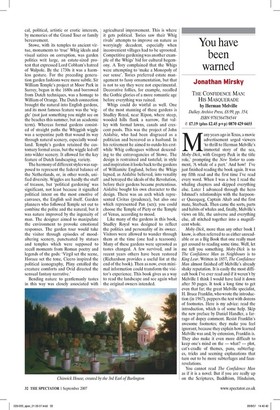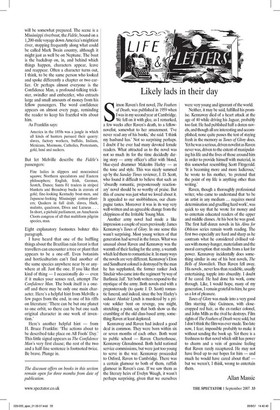You have been warned
Jonathan Mirsky THE CONFIDENCE MAN: HIS MASQUERADE by Herman Melville Dalkey Archive Press, £8.99, pp. 354, ISBN 9781564784544 © £7.19 (plus £2.45 p+p) 0870 429 6655 Many years ago in Texas, a movie advertisement urged viewers 'to thrill to Herman Melville's immortal story of the sea, Moby -Dick, with Gregory Peck in the title role,' prompting the New Yorker to comment, 'A whale of a part.' And how! I've just finished reading the book again. It was my fifth read and the first time I've read every word. When I was a boy I read the whaling chapters and skipped everything else. Later I advanced through the hero Ishmael's relationships with the harpooner Queequeg, Captain Ahab and the first mate, Starbuck. Then came the sorts, parts and habits of whales and, finally, Melville's views on life, the universe and everything else, all stitched together into a magnificent whole.
Moby-Dick, more than any other book I know, is often referred to as either unreadable or as a Big Book that one really must get around to reading some time. Well, let me tell you something. Moby-Dick is to The Confidence Man as Neighbours is to King Lear. Written in 1857, The Confidence Man almost finished off Melville's already shaky reputation. It is easily the most difficult book I've ever read and if it weren't by Melville I think I would have laid it down after 50 pages. It took a long time to get even that far; the great Melville specialist, H. Bruce Franklin, who wrote the introduction (in 1967), peppers the text with dozens of footnotes. Here is my advice: read the introduction, which is of some help. Skip the new preface by Daniel Handler, a farrago of dopey comment. Resist Franklin's awesome footnotes; they make you feel ignorant, because they explain how learned Melville was and, by extension, Franklin is. They also make it even more difficult to keep one's mind on the — what? — plot, cat's-cradle of themes, puns, subterfuges, tricks and seeming explanations that turn out to be more subterfuges and fauxrevelations.
You cannot read The Confidence Man as if it is a novel. But if you are really up on the Scriptures, Buddhism, Hinduism, will be somewhat prepared. The scene is a Mississippi riverboat, the Fidele, bound on a 1,200-mile voyage down America's mightiest river, stopping frequently along what could be called Mark Twain country, although it might just as well be on Neptune. The boat is the backdrop on, in, and behind which things happen, characters appear, leave and reappear. Often a character turns out, I think, to be the same person who looked and spoke differently a chapter or two earlier. Or perhaps almost everyone is the Confidence Man, a profound-talking trickster, swindler and embezzler, who extracts large and small amounts of money from his fellow passengers. The word confidence appears on almost every page, reminding the reader to keep his frazzled wits about him As Franklin says: America in the 1850s was a jungle in which all kinds of hunters pursued their quarry: slaves, factory workers, buffalo, Indians, Mexicans, Mormons, Catholics, Protestants, gold, land and suckers.
But let Melville describe the Fidele's passengers: Fine ladies in slippers and moccasined squaws; Northern speculators and Eastern philosophers; English, Irish, German, Scotch, Danes; Santa Fe traders in striped blankets and Broadway bucks in cravats of gold; fine-looking Kentucky boat-men, and Japanese-looking Mississippi cotton-planters; Quakers in full drab, slaves, black, mulatto, quadroon, Dives and Lazarus . . . In short, a piebald parliament, an Anacharsis Cloots congress of all that multiform pilgrim species, man.
Eight explanatory footnotes bolster this paragraph.
I have heard that one of the baffling things about the Brazilian rain forest is that travellers can encounter a tree or plant that appears to be a one-off. Even botanists and horticulturists can't find another of the same species anywhere near by or anywhere at all. Just the one. If you like that kind of thing — I occasionally do — even if it makes your senses reel, attempt The Confidence Man. The book itself is a oneoff and there may be only one main character. Here's a helpful hint from Melville a few pages from the end, in one of his riffs on literature: 'There can be but one planet to one orbit, so there can be but one such original character in one work of invention.'
Here's another helpful hint — from H. Bruce Franklin: 'The actions about to be described take place on All Fools' Day.' This little signal appears as The Confidence Man's very first clause; the rest of the two and a half-line sentence is footnoted twice. Be brave. Plunge in.
The discount offers on books in this section remain open for three months from date of publication.








































 Previous page
Previous page